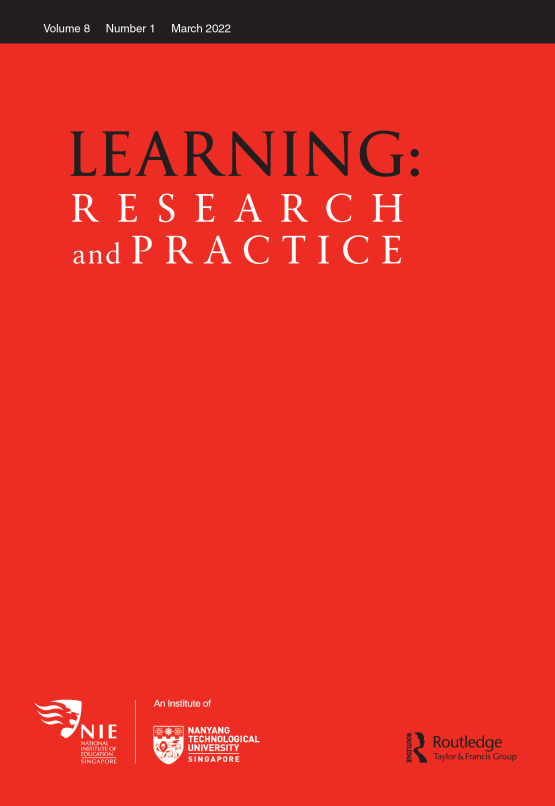Submit a Manuscript to the Journal
Learning: Research and Practice
For a Special Issue on
Optimizing Human Potential: Interdisciplinary Perspectives from the Art, Science, and Technology of Learning
Abstract deadline
30 April 2024
Manuscript deadline
30 July 2024

Special Issue Editor(s)
Azilawati Jamaludin,
National Institute of Education, Nanyang Technological University, Singapore
[email protected]
Stephen M. Kosslyn,
Department of Psychology, Harvard University, United States
[email protected]
Optimizing Human Potential: Interdisciplinary Perspectives from the Art, Science, and Technology of Learning
Learning: Research and Practice journal is preparing a special issue on the topic of the art, science and technology of learning for publication in March 2025.
The intersection of art, science, and technology has played a pivotal role in shaping the landscape of education. This special issue delves into the diverse dimensions of learning, from the neurophysiological to socio-cultural realms, exploring how the evolvement and advancement of these disciplines influence and optimize human potential. As we navigate through the dynamic realms of learning design, assessment, and future-oriented paradigms, this issue aims to capture the multifaceted aspects of the art, science, and technology of learning and its implications on the crux of human potential: learning.
This special issue aims to push the boundaries of educational discourse by delving into cutting-edge knowledge, understanding or research that shape the art, science, and technology of learning. By exploring the intersections of the art, science and technology of learning, we aspire to inspire educators, researchers, and policymakers to embrace innovative approaches that optimize human potential while navigating the ethical considerations inherent in the use of advanced technologies in education. We invite manuscripts that fall broadly into any of these categories or beyond:
- Neuroeducation Design Principles
○ Explore how insights from neuroscience inform the design of effective and active learning experiences.
○ Discuss the application of neuroscientific principles in crafting educational content that enhances memory, attention, and comprehension.
○ Explore the collaborative potential of neuroscience and Artificial Intelligence (AI) in designing personalized, active learning experiences.
- Adaptive Learning Technologies
○ Examine the collaborative use of neurotechnology and AI in developing sophisticated cognitive assessments.
○ Discuss the potential of neuroadaptive systems in tailoring content delivery based on analytics such as real-time brain activity.
- Neurotechnology and Assessment
○ Examine the integration of AI and neurotechnology in assessing cognitive skills and academic performance.
○ Discuss the challenges and opportunities of using neuroscientific methods in creating more nuanced and comprehensive assessment tools.
○ Explore the ethical implications of incorporating neurotechnology and/or AI into educational assessments.
○ Discuss the balance between the potential benefits of enhanced assessment informed by science of learning and the ethical considerations surrounding privacy and consent.
- Neurofeedback for Optimal Learning States:
○ Explore how neurofeedback technologies can be utilized to optimize cognitive states conducive to learning.
○ Discuss the implications of real-time feedback on student engagement, motivation, and performance.
○ Explore how AI algorithms can be integrated with neurofeedback technologies to optimize learning states.
- Future-Oriented Paradigms with Neurotechnology, AI and/or Brain-Computer Interfaces (BCIs)
○ Discuss the potential of AI powered BCIs in promoting neuroplasticity and enhancing cognitive skills.
○ Discuss the application of AI powered BCIs in creating immersive and interactive learning experiences.
- Interdisciplinary Approaches in Subject-Based Banding/Learning
○ Investigate the intersection of neuroscience and STEAM disciplines, exploring how neuroscientific insights can enhance learning experiences in Science, Technology, Engineering, Arts and Mathematics.
○ Analyze how intersections of art, science and technology (such as generative AI) challenges traditional notions of teaching and learning.
○ Discuss the evolving role of educators and the potential redefinition of educational goals in light of interdisciplinary advancements
○ Discuss the potential for cross-disciplinary collaboration in the art, science and technology of learning to unlock innovative approaches for STEAM education.
Other related topics are welcome too. Submissions need to have good argumentation and substantiation as well as direct contributions and implications for learning and/or teaching. Submissions can be conceptual, reviews/syntheses and/or empirical.
Looking to Publish your Research?
Find out how to publish your research open access with Taylor & Francis Group.
Choose open accessSubmission Instructions
We will accept the following types of submissions:
- Research Articles (6,000 words): articles of empirically supported studies on learning or extended theoretical arguments.
- Brief Reports (3,000 words): reports of innovative current work at earlier stages of idea conceptualization and/or empirical exploration that is of high value to learning researchers and practitioners.
- Letter to the Editor/Commentaries (1,000 – 3,000 words): article commentaries, responses to commentaries, and/or discussions of general relevance.
Submitted manuscripts will undergo a blind peer-review process and be evaluated in accordance with the Journal’s quality standards for acceptance into the special issue. Articles submitted need to be substantially different to previously published work though they may constitute significant extensions of prior work.
To be quick to capture the ongoing discourse, this special issue is intended for publication in March 2025. Authors are encouraged to be mindful of the expected timings of the submissions and/or revisions. There might also be some minor adjustments to the timeline.
To submit your abstract (400 words maximum), please click on the form at https://forms.office.com/r/N7VwUQa33y. For inquiries, you may email [email protected] with the subject line: Optimizing Human Potential Special Issue.
Timeline
- Submission of abstracts: by 30 April 2024
- Notification of abstract acceptance: no later than 31 May 2024
- Submission of full manuscripts for review: by 30 July 2024
- Completion of reviews (decisions sent): no later than 30 October 2024
- Submission of revised manuscripts: by 15 January 2025 (hard deadline for papers to be published)
- Notification of final acceptance: no later than 15 February 2025
- Publication: March 2025